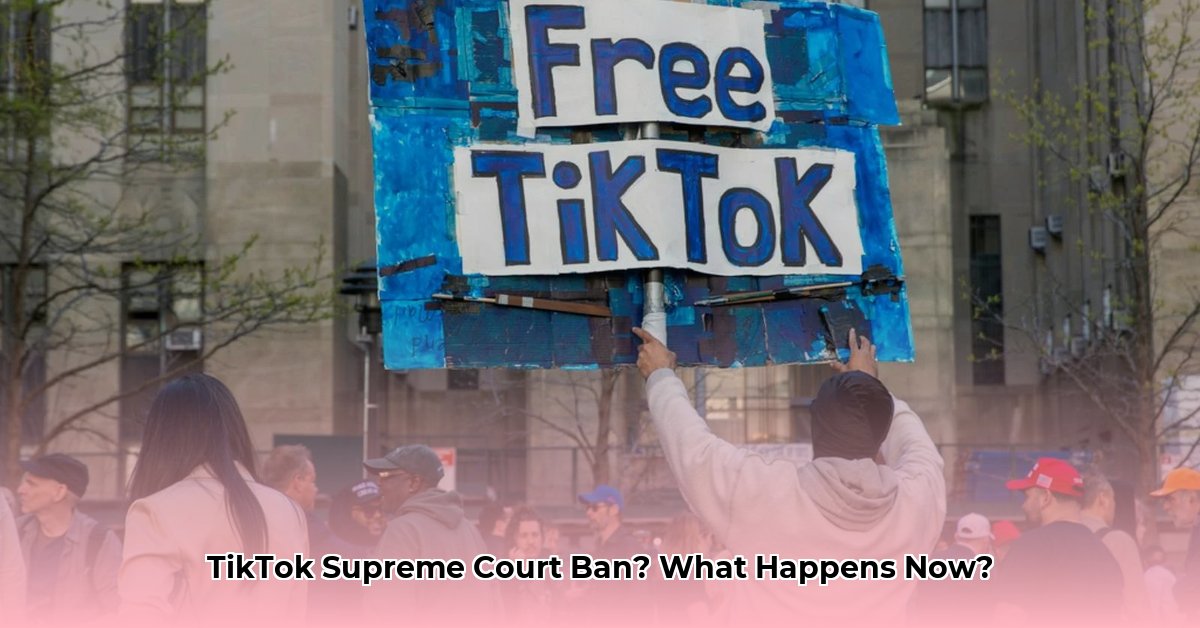This article will be updated as soon as the Supreme Court releases its official decision. Check back for the latest information.
Key Takeaways (Placeholder – Awaiting Official Ruling)
| Key Aspect | Details |
|---|---|
| Decision | Awaiting Supreme Court Ruling |
| Vote Count | Awaiting Supreme Court Ruling |
| Core Reasoning | Awaiting Supreme Court Ruling |
| Immediate Impact | Awaiting Supreme Court Ruling |
Introduction
The Supreme Court heard oral arguments on January 10, 2025, regarding a potential ban on TikTok. This case grapples with fundamental questions about national security, free speech, and the government’s power to regulate social media platforms. Concerns over TikTok’s data practices and potential ties to the Chinese government have fueled the debate. This article will provide a comprehensive analysis of the Supreme Court’s decision (once released), its implications, and the potential future of TikTok in the United States.
The Legal Battle
The legal challenges surrounding TikTok stem from concerns that the app’s data collection practices could allow the Chinese government access to sensitive user information, posing a national security risk. The U.S. government has argued that this potential access, combined with the app’s vast user base and influence, presents a significant vulnerability.
TikTok has countered these arguments by asserting that its data security measures are robust and that a ban would infringe upon users’ First Amendment rights. They maintain that their operations adhere to U.S. laws and regulations, and that concerns about data sharing are unfounded. The company has also emphasized the platform’s importance as a venue for free expression and communication.
Supreme Court Arguments
Reports from the January 10, 2025, oral arguments suggest that the Justices expressed skepticism about TikTok’s arguments, with national security concerns appearing to be at the forefront of their considerations. However, without the official ruling, it is impossible to definitively state the Court’s position.
The Ruling (Awaiting Official Release)
This section will be updated with a detailed analysis of the Supreme Court’s decision as soon as it is released. This will include the main points of the majority opinion, any dissenting opinions, and the legal reasoning behind the decision. Direct quotes from the opinions will be included to provide accurate and insightful context.
Implications
The Supreme Court’s decision will have profound implications for TikTok, its users, and the broader tech landscape. A ban could force TikTok to cease operations in the U.S., impacting millions of users and content creators. It could also set a precedent for regulating other social media companies, particularly those with foreign ownership. Conversely, if the ban is overturned, it could signal a limit on the government’s ability to regulate online platforms in the name of national security.
Reactions (Placeholder)
This section will include reactions from government officials, TikTok representatives, legal experts, and content creators once the decision is announced.
Future Outlook
Depending on the ruling, potential next steps could include appeals, new legislation from Congress, or significant changes to TikTok’s operations in the U.S. The decision will likely spark further discussion about the balance between national security and free speech in the digital age. It may also prompt increased scrutiny of data privacy practices across the social media industry.
Related Information (Placeholder)
Links to the official court documents, government statements, and relevant news articles will be provided upon the release of the Supreme Court’s decision.
What Happens if TikTok is Banned?
If the Supreme Court upholds the ban, several potential scenarios could unfold:
- Removal from App Stores: TikTok could be removed from U.S. app stores, preventing new downloads and updates.
- Operational Restrictions: The government could impose restrictions on TikTok’s operations within the U.S., limiting data collection or server locations.
- Divestiture: ByteDance may be compelled to sell TikTok to a U.S.-based company to address national security concerns. However, the feasibility and effectiveness of such a divestiture remain uncertain.
What if the Ban is Overturned?
If the ban is overturned, TikTok would likely continue operating in the U.S. under its current structure. This outcome could lead to greater scrutiny of government efforts to regulate social media, potentially strengthening free speech protections online. However, it may also prompt Congress to pursue new legislation to address national security concerns related to foreign-owned tech companies.
The Broader Impact
Regardless of the outcome, this case highlights the growing tension between national security and individual liberties in the digital age. It also underscores the complexities of regulating global technology platforms and the need for careful consideration of the potential consequences of such actions.
No official Supreme Court ruling on this matter has been issued yet. This analysis is based on reporting surrounding oral arguments presented to the court and will be updated upon the release of the official decision.







